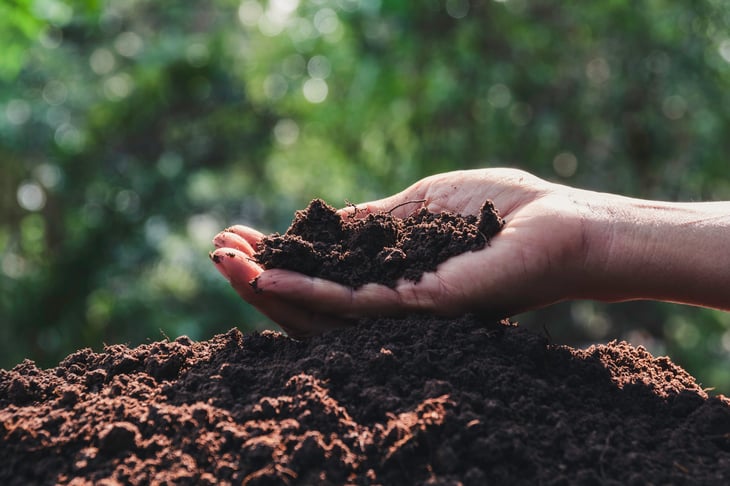
California recently became the fifth U.S. state to legalize human composting as an alternative to traditional burials and cremation.
While some of us have heard of the green burial movement that offers more environmentally friendly ways for conducting funerals and burials, not everyone is familiar with human composting (also called natural organic reduction).
What is it? And where in the United States, besides California, is it legal? Read on to learn the answers to these questions and more.
What is human composting?

Composting — or decomposition — happens, as most know, when organic materials are placed directly in the earth and allowed to biodegrade.
When people talk about “human composting,” though, they typically are referring to above-ground decomposition, or recomposition — a specific process for turning human remains into soil.
Stateline (a publication of the Pew Charitable Trusts) writes:
“The process involves placing human remains in a steel box with biodegradable materials, which help the body naturally decompose. That produces soil, which is given to family members, who may spread it or use it to grow plants.”
That process takes six to eight weeks.
The advantages of human composting

The public appears receptive to alternative funeral practices. The 2022 Consumer Awareness and Preferences Report from the National Funeral Directors Association (NFDA) notes that 60.5% of polled Americans said they’d “be interested in exploring ‘green’ funeral options because of their potential environmental benefits, cost savings or for some other reason.”
Cremation of a single human body sends about 190 kilograms (418 pounds) of carbon dioxide into the air — like driving a car for 470 miles, according to Chemical & Engineering News, published by the American Chemical Society.
Burials have their own problems, placing millions of liters of embalming fluid into the earth each year and using 47,000 m3 (about 1.7 million cubic feet) of wood for coffins annually, the publication says.
Another benefit of composting is that it gives those who choose it (and their grieving families and friends) the chance to express and act on their values. Also, it offers an opportunity to feel a part of the death process — something both heart-wrenching and beautiful, says Recompose, a green funeral home in Seattle.
How much does human composting cost?

As for costs, human composting appears about on par with conventional funeral home services:
- Recompose, for example, costs $7,000 (not including a ceremony);
- The median cost of a funeral with burial in 2021 was $7,848, according to the NFDA.
- The median price of a funeral with cremation was $6,971.
In fall 2022, California became the fifth state to legalize human composting, with the law to take effect in 2027. Following are all states that have passed laws allowing this practice.
California

The law: Assembly Bill 351
When it takes effect: 2027
In September 2022, California became the fifth state to approve the use of human composting.
Next, perhaps, may be New York, Axios reports. Proponents there are pressing to make their state the sixth in the nation to allow human composting.
Vermont

The law: House Bill 244 (Act 169)
When it takes effect: 2023
Vermont’s governor signed that state’s bill regarding human composting into law in June 2022.
In addition to composting, the bill covers another green burial alternative: alkaline hydrolysis. This option consumes less energy than cremation but more than human composting.
The Sierra Club describes the process:
“The body is placed in a stainless steel container filled with 95 percent water and 5 percent alkali (i.e., lye) that is then pressurized and heated to 300°F. After three hours, all that’s left are a brittle skeleton that can be crushed into powder and a liquid safe enough to be discharged into a municipal waste system.”
Colorado

The law: Senate Bill 21-006
When it took effect: 2021
In March 2022, supporters of human composting in Colorado celebrated as soil from composted human remains was spread on a field. It was a first, after the state legalized the process in 2021.
If you are concerned about where the soil from composted human remains could end up, “There are strict laws preventing the soil from being used to grow any food that people could eat,” according to Houston’s KHOU-11 TV.
Oregon

The law: House Bill 2574
When it took effect: 2022
A Q&A on the website of Oregon’s legislature addresses some concerns about human composting, including worries that it could release pharmaceuticals or heavy metals into the soil.
Washington State University and Western Carolina University have studied the process, the site says. WSU found heavy metals (such as cadmium, arsenic, copper, lead, zinc and mercury) remaining to be well under EPA limits. And 95% of prescription drugs tracked by researchers were broken down in composting.
Washington

The law: Senate Bill 5001
When it took effect: 2020
Washington was the first state to allow human composting.
Entrepreneur Katrina Spade struck on the idea of human composting after learning that farmers use a similar process for disposing of animal remains, Smithsonian reported in 2019, when Washington State passed its law.
Spade founded Recompose, pioneering a movement that has so far changed laws in five states. Recompose’s “history” offers a timeline.
